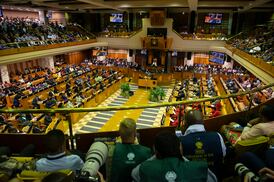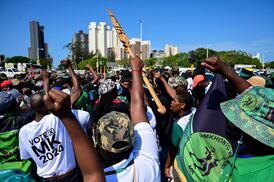The start of President Cyril Ramaphosa’s tenure in 2018 was supposed to mark the official end of the state capture nightmare and the start of a new era of accountability, transparency and ethical, clean governance.
Who can forget how Ramaphosa expressed shock at the emergence of new revelations of how state entities were looted, government departments and key entities hollowed out, and the country’s coffers turned into a piggy bank for politically connected cronies and their buddies.
In response to these “shocks”, Ramaphosa instituted all manner of commissions of inquiry — from the Zondo commission on state capture, the Mpati commission investigating malfeasance and governance failures at the Public Investment Corporation, and the Nugent commission to get to the bottom of how the capacity of the SA Revenue Service (Sars) was destroyed for personal and political gain.
Commissions of inquiry — especially judicial ones — are exhaustive exercises that often take months, if not years to get through their work. Witnesses get called and evidence is led, culminating in voluminous reports with extensive recommendations. But the thing about reports is that they end up gathering dust if there is no political will to act on them.
It was like the president was saying, I don’t care what you have found about these people, I think they are good enough to be promoted.
— Raymond Zondo, former chief justice
This is exactly what former chief justice Raymond Zondo is decrying in a report we publish elsewhere in this newspaper today. He is frustrated and aggrieved that after all the work his more-than-R1bn commission had put in, few, if any, of its recommendations were implemented.
In an unprecedented and blistering attack on Ramaphosa, Zondo specially takes issue with the president appointing as ministers some of the very people his commission made serious and adverse findings against.
“It was like the president was saying, I don’t care what you have found about these people, I think they are good enough to be promoted,” the usually composed Zondo bemoans.
He is angered even more by being required to swear into office the people in question. “One was a deputy minister who was now promoted to a full minister, and I had to swear them in, knowing the findings I had made.”
Now that he no longer occupies the highest judicial office in the land, Zondo is well within his rights to speak out. Commissions of inquiry are a waste of time and money if their recommendations are simply cast aside, and those they finger get rewarded with high political positions instead of facing consequences for their actions.
But it is not the president alone who is guilty of these double standards. Last week Business Times reported how McKinsey and Bain — two global management consultancies that were at the heart of the looting of our strategic state-owned entities — have been roped in to do work for the B20, the business arm of the Group of 20.
Bain was central to an organisational restructuring of Sars under former commissioner Tom Moyane, which weakened the institution’s capacity. In 2022, it was banned from state contracts in South Africa for 10 years. The Zondo Commission found that McKinsey’s work for Eskom and Transnet was mired in irregular procurement practices. The company was forced to return more than R1bn of the fees it charged SOEs for its services.
Business Unity SA (Busa) CEO Khulekani Mathe reduced the involvement of the tainted consultancies in G20 activities to the need for continuity. Its sister organisation, Business Leadership SA (BLSA), has previously defended a decision to keep Bain as member.
This is rich coming from organisations that always make deafening noises about failures of government. The actions of the two business bodies are just as disappointing as Ramaphosa’s decision to appoint state capture accused, and serve merely to cast doubt on their commitment to the battle against corruption.





Would you like to comment on this article?
Sign up (it's quick and free) or sign in now.
Please read our Comment Policy before commenting.